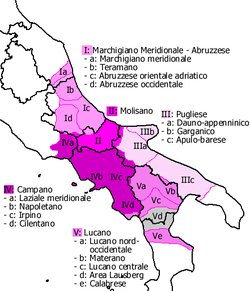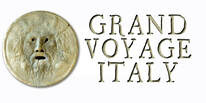 Map of variants of the Neopolitan dialect in Italy Map of variants of the Neopolitan dialect in Italy From a story in Panaram Italia: UNESCO recently declared that the Neapolitan dialect should be considered a language on its own. Spoken across Italy, Neapolitan is most dominant in Lazio, Abruzzo and Molise, Puglia and Calabria. Its origins go as far back as the time of Pompei. It then thrived under Federico II up until the reign of the Aragonesi. Under the Spanish domination, it used to be the State’s official administrative language. Neapolitan experienced many changes and influences throughout its evolution, but it always remained close to its original roots. That’s up until the Savoia’s reign. With the arrival of Garibaldi and the end of the Regno delle due Sicilie, Neapolitan was officially substituted with Italian, even though French used to be the administrative language of Piemonte in the early 1800s. Parliament had even suggested officially abolishing the Neapolitan dialect, which was considered to be prevalently spoken by second-class citizens. Throughout time, the Neapolitan language has experienced many variations, which purists would define as “vulgar influences,” yet it inspired many great poets and writers. According to historians and linguists, the Neapolitan dialect can easily be considered Italy’s second official language, thanks in part to popular songs that have contributed to spreading its influence across the world. No other dialect is as popular and yet, UNESCO has declared Neapolitan as a language to be preserved and protected. According to the international body, it is an easy shortcut to classify Neapolitan as a dialect. This declaration gives pride to all of those that express themselves using this colourful language, not only in Italy, but all around the world. Here's my take on it. Everywhere in Italy--North or South, Sicily, and Sardinia--there are dialects. Often the dialects change and evolve into sub-dialects from village to village within a single region. Is the Neapolitan dialect a separate and distinct language? I don't think so. He's my reasoning... My Dad spoke Molfetese dialect and my Mother spoke Neapolitan--her family was from Naples. She could understand him, he could understand her. Most people who speak dialect also speak Italian, but of course, they cherish and speak their own dialect as well. I applaud that attitude. But they are all speaking various forms of Italian that evolved and morphed differently in the various regions in Italy. Once you've been to Italy you can understand why... the amazingly rugged landscape itself must have made it very difficult to go from one region to another, so the language evolved differently from hill town to hilltown, from valley to valley.
Think of it this way... It's like someone from Texas saying "y'all" instead of "you all", along with the odd ways they use the expression in conversation. We all have regional differences in American English and though it might be difficult to understand ever word we Americans say to each other at times (remind me to tell you about a country auction in West Virginia I attended once...) we still are speaking the same language. Just think of how French has evolved differently in various parts of the world. The French in La Belle France is the purest, but there are dialects within that country too. The French spoken in Haiti or Quebec or in Cajon-Zydeco country in East Texas and Lousiana are all very different from the French spoken in France simply because they evolved separately from the Mother Tongue. But in the end, in a pinch, all of them could have a basic conversation with each other. High Italian is "the" Italian and but the dialects from various regions are valid too. Each has its place. It makes Italian all the more textured and colorful. I'm glad UNESCO wants the Neapolitan dialect to be preserved, but to declare it as its own language is a stretch. Italy is a mish-mosh of regions--it always was and perhaps always will be. The one outstanding truth I learned from traveling in Italy is... There is no one single "Italy". --Jerry Finzi If you enjoyed this post, please share it with your friends on your favorite social media! Ciao!
8 Comments
GORUN
3/9/2018 06:30:03 pm
Very good article and very detailed. Thank you so much.
Reply
Irena
9/21/2020 03:30:36 pm
Norwegian, Swedish and Danish speakers can understand each other too, they have the same roots - should they be considered dialects as well?
Reply
Umberto
6/22/2021 03:14:12 pm
Irena, there are various possible answers to your question. Perhaps the most revealing, or at least most realistic, approach is to view non-Finnish Scandinavia as a large unit. In that area, varieties of a language usually known as North Germanic or simply Nordic are spoken. If one is fond of the term dialect, then Danish, Swedish, Norwegian can be viewed as North Germanic dialects, each in turn with its internal sub-types (such as North Jutlandic, South Jutlandic...).
Reply
Umberto
6/22/2021 02:44:06 pm
Some misconceptions in this article. This is perhaps the most misleading one, referring to Italians speaking the traditional native languages of their towns:
Reply
Andrea
5/3/2022 04:12:00 am
I agree with Umberto.
Reply
Umberto
5/3/2022 11:49:40 am
Actually, Celtic/English is a very different sort of historical and "genetic" relationship. They're much more distantly related than Napoletano/Italian are. The latter two are Romance languages, i.e. modern continuations of Latin, just like Catalan, Portuguese, Spanish (...Venetan, Romagnol, Picard...) etc. Romance languages share numerous features from the source language, Latin, and over time they have developed features of their own. Mutual intelligibility varies widely by language and by speakers. Most native speakers of Italian would have little or no trouble deciphering a proverb such as "Chi nun sta ‘a sentì a mamma e pate va a murì addò nun sape" (rough translation: One who doesn't listen to Mom and Dad is going to end up -- literally die -- lost). At the same time, a Neapolitan can easily produce something incomprehensible (just as the speaker of Catalan, Portuguese... can).
Reply
Jerry Finzi
5/19/2022 02:43:07 pm
Umberto,
Federico
3/16/2023 11:52:25 am
I disagree. I would say that in Naples there are two dialects, the Neapolitan dialect of Italian, and the Neapolitan dialect of Neapolitan. The former is the variety of standard Italian spoken in Naples, it's almost the same as in other parts of the country, but it has some informal peculiarities and accent. The latter is the variety of Neapolitan the language, spoken in Naples. Obviously that dialect is part of a dialect continuum that makes up the Southern Italian language spoken throughout southern Italy. It would make sense for someone from Naples and Molise to understand each other, because they both speak a dialect of that language.
Reply
Your comment will be posted after it is approved.
Leave a Reply. |
Categories
All
Archive
June 2024
|


 RSS Feed
RSS Feed
